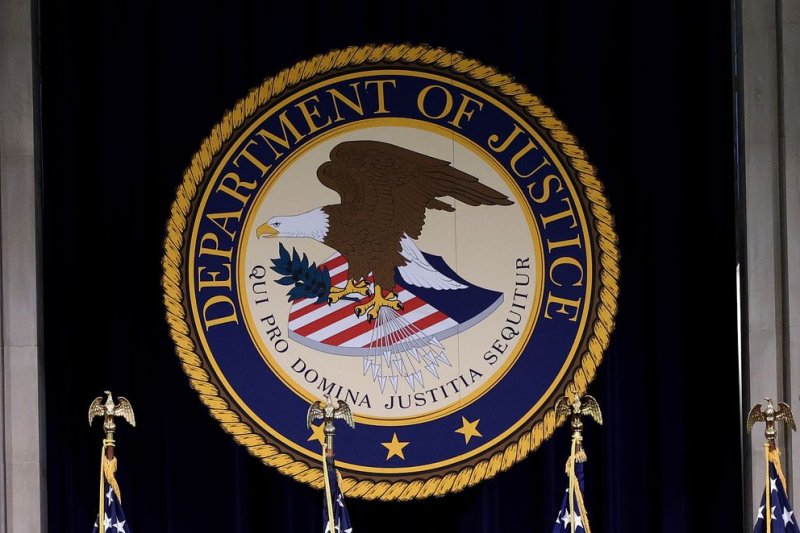One man was sentenced to more than two years in prison and another was convicted on charges that were applied under the now-shuttered Justice Department's China Initiative, which the previous Trump administration launched in 2018, attracting criticism it showed departmental bias. Pool File Photo by Win McNamee/UPI |
License Photo
April 8 (UPI) -- A former Monsanto employee has been sentenced to more than two years in prison for spying for China while a University of Kansas researcher was convicted of concealing his conflict of interest ties in the Asian nation.
The two men were charged under the now-shuttered Justice Department's China Initiative, which the previous Trump administration launched in 2018, attracting criticism it showed departmental bias.
With the goal of prosecuting economic espionage conducted to benefit China, dozens of academics and scientists, predominately of Chinese nationality, were charged with stealing trade secrets.
On Thursday, Haitao Xiang, 44, of Chesterfield, Mo., was sentenced to 29 months in prison followed three years of supervised release and a $150,000 fine after pleading guilty in January to one count of conspiracy to commit economic espionage.
It is the first-ever economic espionage conviction in the history of the Eastern District of Missouri with fewer than two dozen such convictions nationwide.
"Today's sentencing is a culmination of more than five years of tenacity and dedication by our agents and federal prosecutors," Acting Special Agent in Charge Akil Davis of the FBI's St. Louis Field Office said in a statement.
From 2008, Xiang worked as an imaging scientist for Monsanto, which was bought by Bayer in 2018, and its subsidiary The Climate Corporation, and was arrested a day after leaving his position in June of 2017 while awaiting to board a flight to China.
Authorities found in his possession a one-way ticket to the Asian nation and electric devices carrying copies of proprietary trade secrets -- specifically a predictive algorithm considered a critical component to a platform farmers used to collect, store and visualize agricultural field data.
The Justice Department said Xiang was recruited into a Chinese government program that uses academics and scientists working abroad to harvest intellectual property for Beijing.
"Xiang conspired to steal an important secret to gain an unfair advantage for himself and the PRC," Assistant Attorney General Matthew Olsen said in a statement, referring to China by the initials of its official name, the People's Republic of China. "Economic espionage is a serious offense that can threaten U.S. companies' competitive advantage, and the National Security Division is committed to holding accountable anyone who steals trade secrets to benefit a foreign government."
Feng Tao, 50, of Lawrence, Kan., was also convicted Thursday by a federal jury on three counts of wire fraud and on count of false statements for hiding his affiliations with a Chinese university while working on U.S. government funded research at the University of Kansas.
During the trial, prosecutors said Tao, who has been an associate professor and researcher at the U.S. university since 2014, signed a five-year contract to be a full-time employee at Fuzhou University in May 2018.
Tao was accused of not informing the Kansas Board of Regents about his position at the Chinese university nor did he seek permission before entering the contract and in December 2018 he moved to his native country to work full time at Fuzhou University while telling his U.S. employer he was in Europe, prosecutors said.
While employed by Fuzhou University he conducted research contracted by the Department of Energy and the National Science Foundation.
"Tao caused KU to submit to DOE and NSF hundreds of thousands of dollars in reimbursement requests for expenditures associated with the grants," the Justice Department said. "Tao repeatedly certified electronic documents indicating he read and understood the federal government and KU's policies and that he had made all necessary disclosures."
Tao faces up to 20 years' imprisonment and a fine of up to $250,000 for wire fraud and up to 10 years' imprisonment and a fine of $250,000 on each of the program fraud counts.
The indictment against him states that his agreement with Fuzhou University was under the Changjiang Professorship talent program sponsored by the Chinese government, which is designed to "attract, recruit and cultivate high-level scientific talent in furtherance of China's scientific development, economic prosperity and national security."
"The government of China does not hesitate to go after the ingenuity that drives our economy," said Assistant Director Alan Kohler Jr. of the FBI's Counterintelligence Division. "Stealing our highly prized technology can lead to the loss of good-paying jobs here in the United States, affecting families and sometimes entire communities."
In announcing the end of the China Initiative in February, Olsen said that while the threat China poses continues, a review of the program found that the approach was not right.
"By grouping cases under the China Initiative rubric, we helped give rise to a harmful perception that the department applies a lower standard to investigate and prosecute criminal conduct related to that country or that we in some way view people with racial, ethnic or familial ties to China differently," he said.
Despite ending of the program, he said that the Justice Department will still be "relentless in defending our country from China."
"The department will continue to prioritize and aggressively counter the actions of the PRC government that harm our people and our institutions," he said. "But our review convinced use that a new approach is needed to tackle the most severe threats from a range of hostile nation-states."















